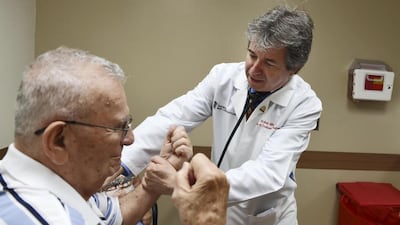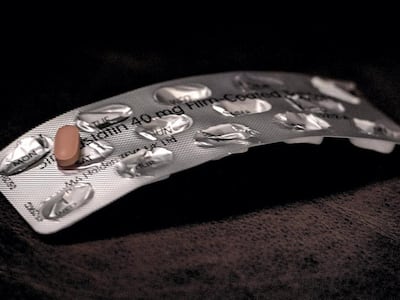Fears that life-saving statins often cause severe side-effects have been allayed by a type of study that may one day help doctors tailor treatments to every patient.
Last year, The National told how many patients with heart disease stopped taking the medication, citing side-effects they insisted were triggered by the drugs that lower cholesterol.
Key research was undertaken to examine those concerns and find if patients were putting themselves at undue risk by halting their use of the drug.
What do statins do?
Introduced by pharmaceutical companies in the late 1980s, statins cut levels of the “bad” form of cholesterol that has been linked to cardiovascular disease. Many studies have shown that statins cut the risk of heart attacks and stroke by around 30 per cent. This has led to statins being one of the most widely-prescribed of all drugs, taken by millions daily.
However, over recent years statins have been dogged by reports of side-effects so severe that many patients simply stop taking the drugs, despite the risks involved.
What are the side-effects?
Many patients report experiencing increased muscle pain and weakness after being prescribed statins. Doctors accept that statins can cause a breakdown of muscle tissue, but studies suggest this is extremely rare, affecting around one patient in 10,000.
This has led to the suspicion that most reports of side-effects are “all in the mind”. Critics point out, however, that patients likely to suffer side-effects are usually barred from entering clinical trials. This would give a misleadingly low figure for the true prevalence of side-effects. Some studies have also been funded by the pharmaceutical industry, raising questions about impartiality.
What has the new study revealed ?
Now an independent team of researchers at the London School of Hygiene and Tropical Medicine, London, has focused solely on patients reporting side-effects so severe they have either stopped or are about to stop taking statins.
To find out if the drugs were to blame, more than 150 such patients were given a supply of pills – but were not told whether the pills were a real statin or a useless placebo. Over the course of eight weeks, the patients had to record their level of muscle discomfort. They then received a fresh supply of pills, again without knowing if they were a real statin or placebos, and recorded their new level of discomfort.
After a year, the researchers – who were also unaware of which patients got what – analysed the results. Published in the current issue of the British Medical Journal they showed no evidence that taking the statin increased the level of muscle pain. If anything, there was a hint the statin produced a slight reduction in symptoms.
When told of the outcome, around two-thirds of the patients changed their minds about the link with statins, and reported they had begun taking them again.
Are the symptoms “all in the mind?”
The researchers stress the results do not mean that patients are imagining their pain. Instead, they support the view that, whatever the true cause of the pain, its intensity is not affected by taking statins. Instead, the pain may fluctuate naturally, and patients may incorrectly associate this with the statin.
Recent research suggests a potential role for the so-called nocebo effect – the “evil twin” of the better-known placebo effect – where patients convince themselves a drug they have begun taking is making them feel worse.
In a study reported in The National, patients reported their pain levels doubled once they began taking a pill – regardless of whether it was a real statin or an inert substitute. Again, this does not mean the pain is imaginary. Studies have shown that the nocebo effect can activate areas of the brain linked to the experience of real symptoms.
Could this type of study resolve other medical mysteries?
Most clinical trials involve large numbers of patients, half of whom are given a new treatment while the others get a placebo. But such studies cast little light on the key question facing family doctors: which is the best treatment for my patient ?
Both the new study and the nocebo trial take a radically different approach. Known as N-of-1 studies, they focus on the response of individuals, rather than some fictional “average patient”. In principle, such N-of-1 studies could be used by family doctors to tailor some forms of treatments to individual patients.
However, such studies are currently regarded as experiments by many regulatory bodies, and thus have to be approved by independent experts and ethical committees. That may one day change, however.
What should you do if you have side-effects from statins?
You should talk to your doctor before discontinuing any prescription drug – including statins. This may lead to a lower dose or different form of statin being prescribed. Simply stopping may put you at unnecessary additional risk of life-threatening events like strokes or heart attacks.
Robert Matthews is Visiting Professor of Science at Aston University, Birmingham, UK


